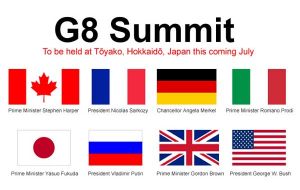MercoPress. South Atlantic News Agency
Food and fuel top of the agenda of G8 summit in Japan

World leaders are preparing to begin a key summit in Japan, with the global economy and its rising food and fuel costs looming as the main issues.
The Group of Eight (G8) industrialized nations will be joined by leaders from fifteen other countries which have been invited including China, India, Brazil and South Africa, among others. The Group of Eight consists of Britain, Canada, France, Germany, Italy, Japan, Russia and the United States. The summit gets under way with an opening lunch, where African leaders will say rising costs have worsened the plight of the world's poorest people. The G8 summit is being held at a resort on the northern island of Hokkaido. Japan has spent a record sum of money (250 million US dollars) and deployed about 21,000 police to seal off the remote lakeside town of Toyako before the three days of talks. "The participants this year will discuss global issues, including the immediate dangers posed by the soaring prices of crude oil and foodstuffs as well as climate change" Japanese Prime Minister Yasuo Fukuda said in a statement. "They will also discuss international assistance to African development and the dual threats to world peace posed by the proliferation of weapons of mass destruction and terrorism". Japan's original idea was to make climate change the focus of this year's summit. But the impact on the global economy of price rises and other shocks such as the credit crunch have already eclipsed that concern, correspondents says. Speaking at a joint news conference with Japanese PM Yasuo Fukuda on Sunday, US President George W Bush acknowledged that the US economy was not as robust as he would like. Mr Fukuda said he and Mr Bush had agreed that there was "a need for swift efforts" to tackle surging oil and food prices that are "having a negative impact on the world economy". Mr Bush arrived in Japan for pre-summit talks with Mr Fukuda on the next steps in the North Korean nuclear dispute. As well as discussing development issues in Africa, the G8 leaders are widely expected to condemn Robert Mugabe's controversial re-election in Zimbabwe last month. A number of other bilateral meetings are taking place on the sidelines of the summit. Mr Bush in his last G8 summit and Russian President Dmitry Medvedev attending his first, are expected to discuss the US plan for missile defense installations in the Czech Republic and Poland. British Primer Minister Gordon Brown will also have talks with Mr Medvedev. Relations between the two countries have been uneasy since the Russian agent turned dissident Alexander Litvinenko was murdered in London two years ago. Meanwhile, the charity Water Aid has told the G8 that the single most effective measure it could take to prevent the deaths of millions of children in poor countries would be to build toilets and provide clean water. Hundreds of protesters again marched through Sapporo on Sunday, the city closest to the venue, on the eve of the talks to demand G8 leaders take action on global warming, poverty and rising food prices. The demonstration, which followed a similar protest on Saturday, was heavily policed and ended peacefully. As the G8 got under way in Japan, leaders of the world's largest Islamic nations assembled for what is being billed as the D8 summit in Malaysia's capital, Kuala Lumpur, with the issue of inflation high on the agenda.




Top Comments
Disclaimer & comment rulesCommenting for this story is now closed.
If you have a Facebook account, become a fan and comment on our Facebook Page!